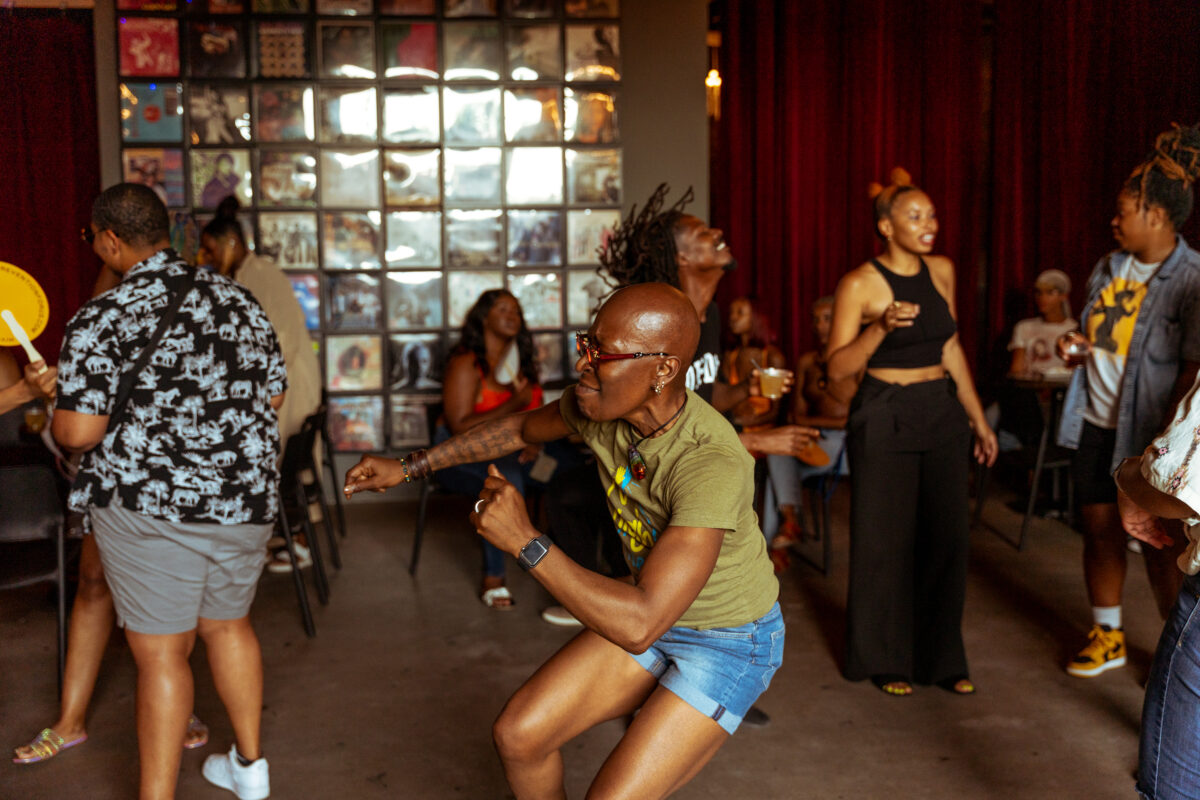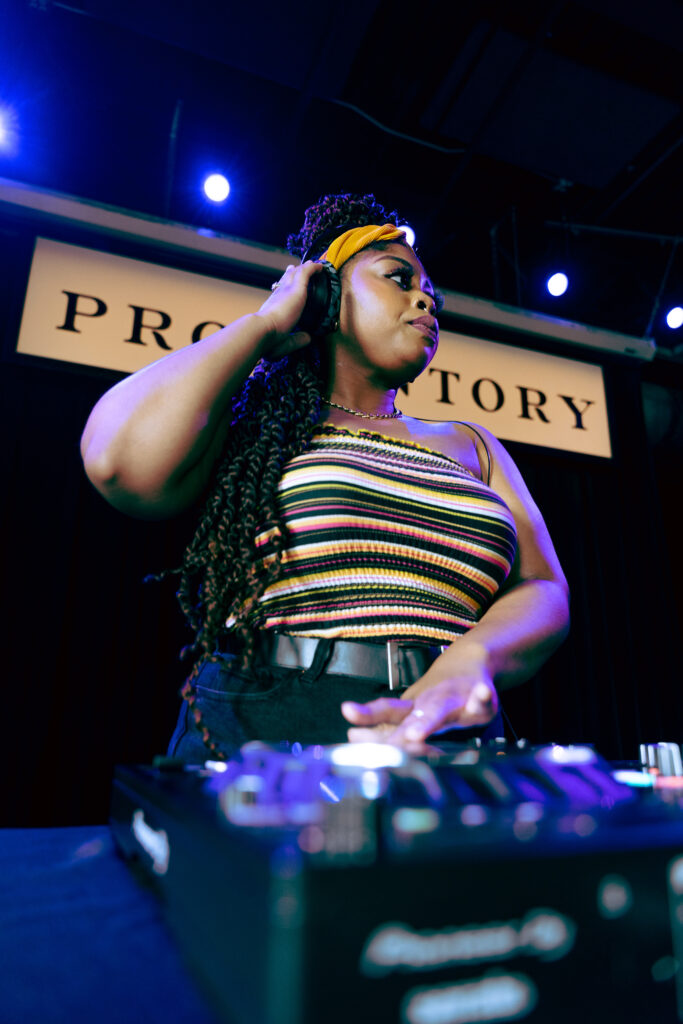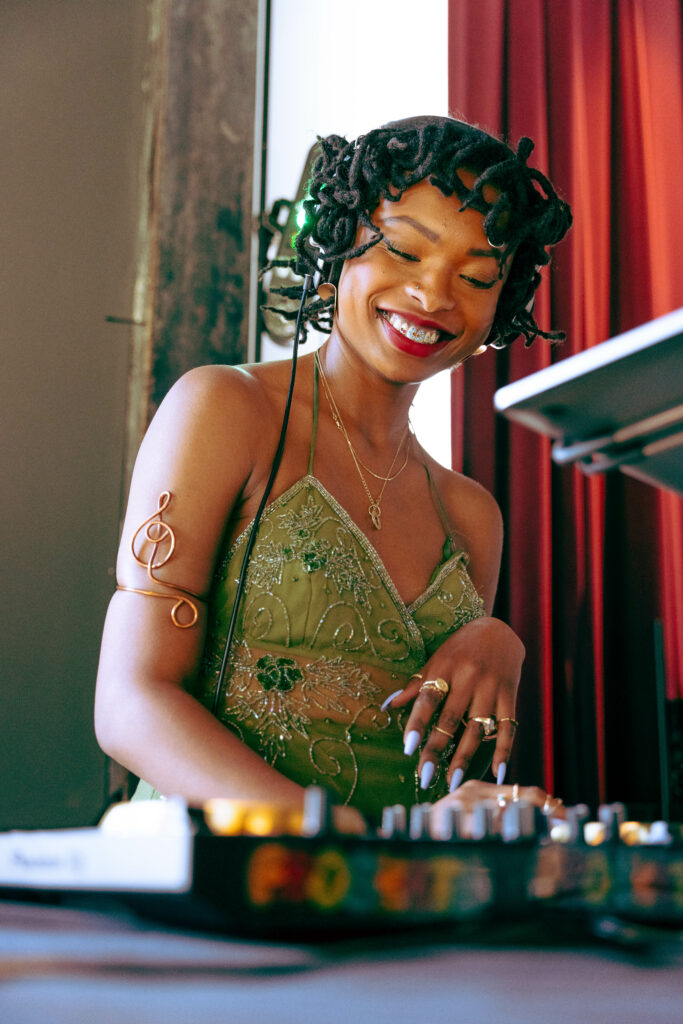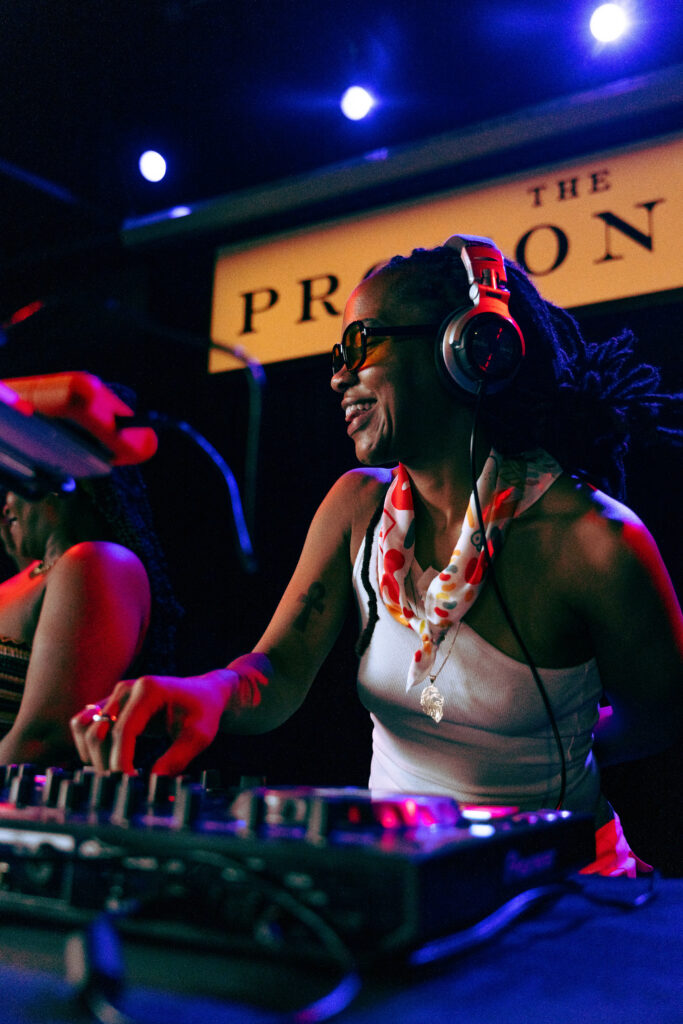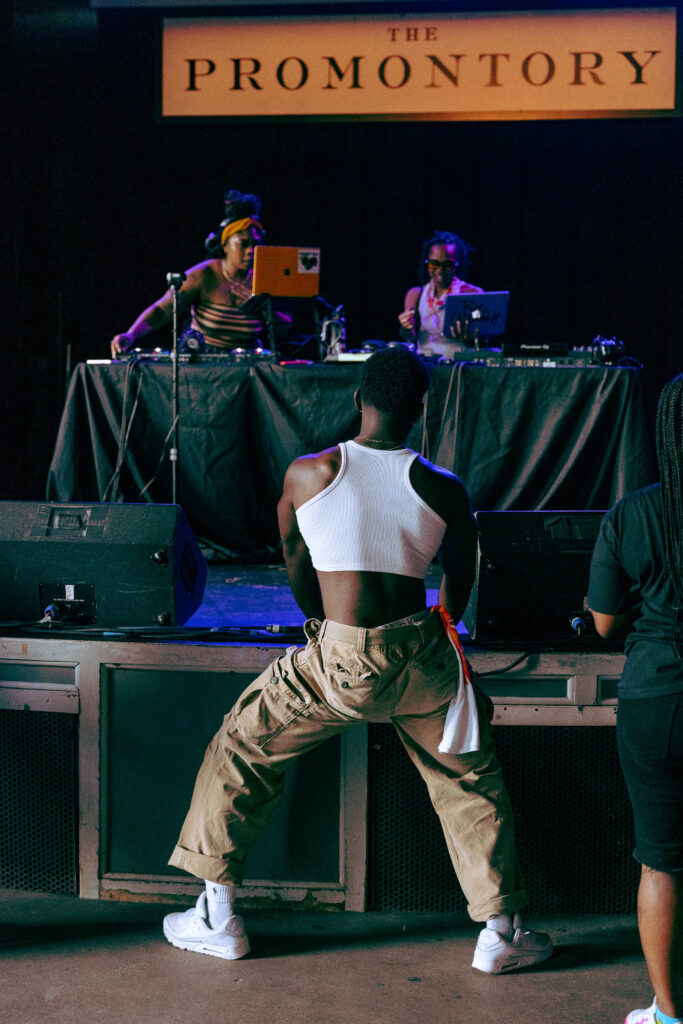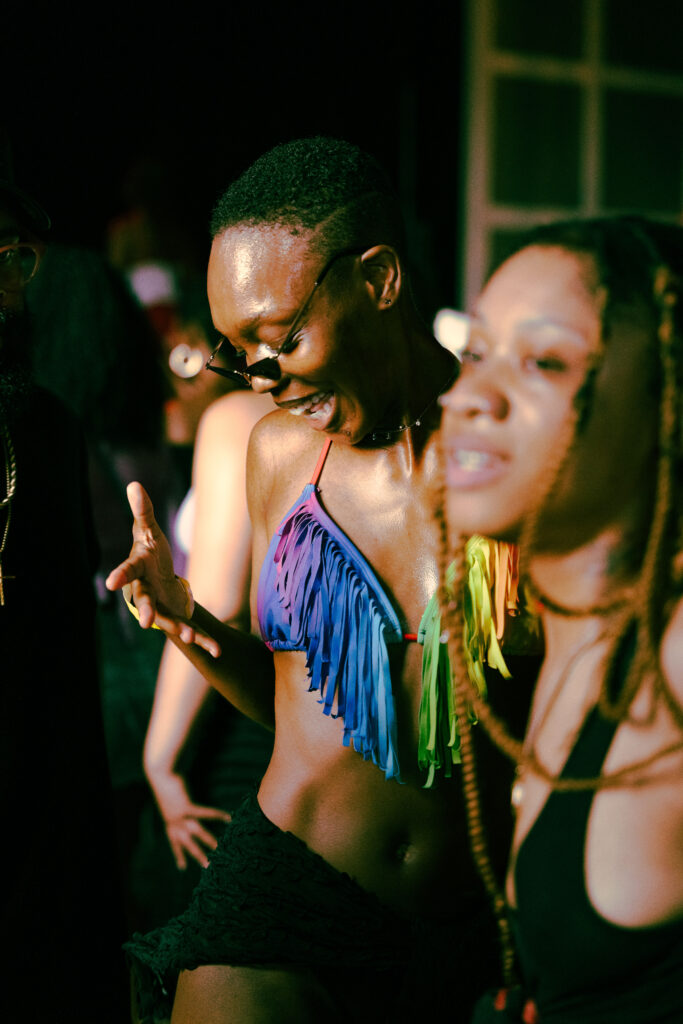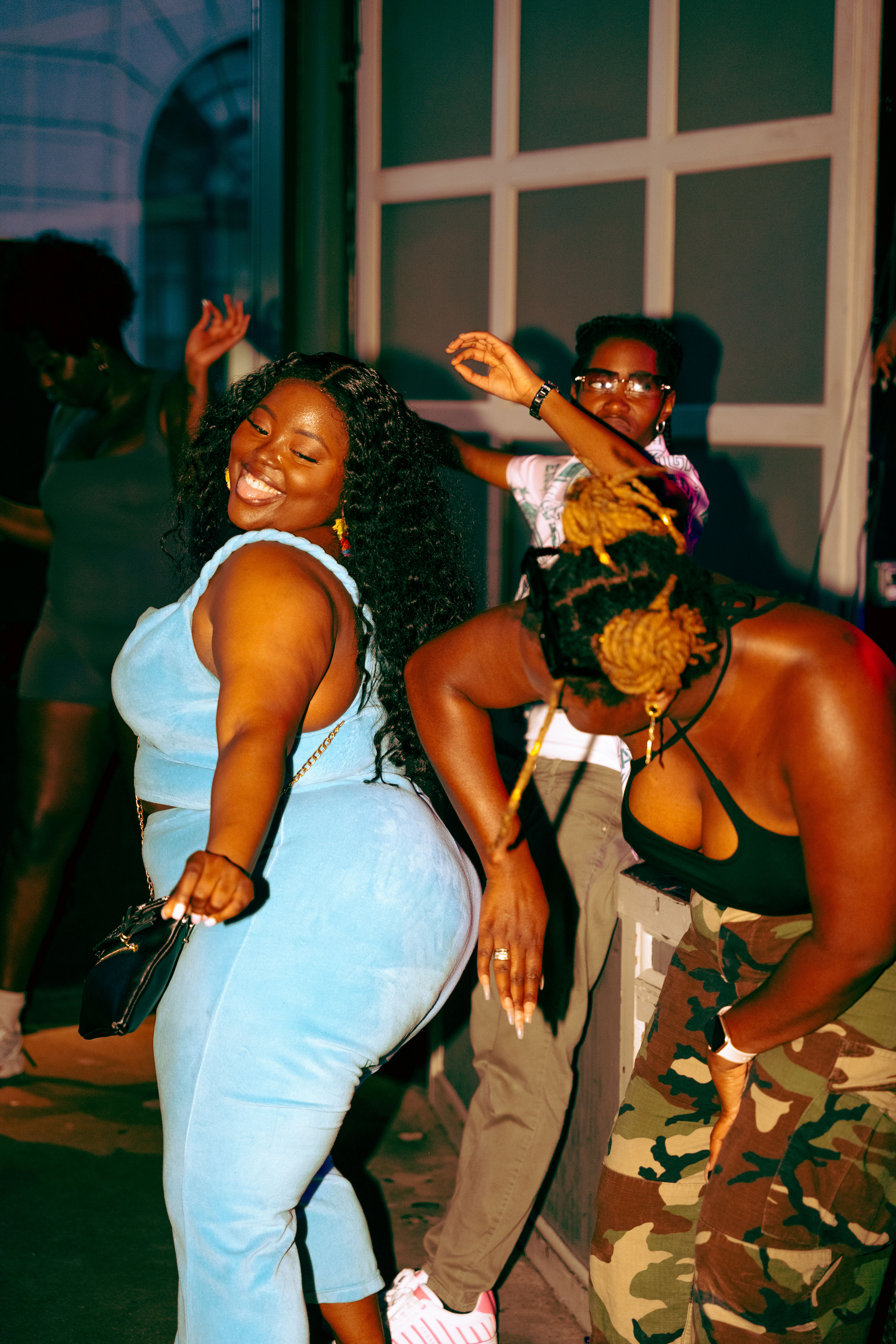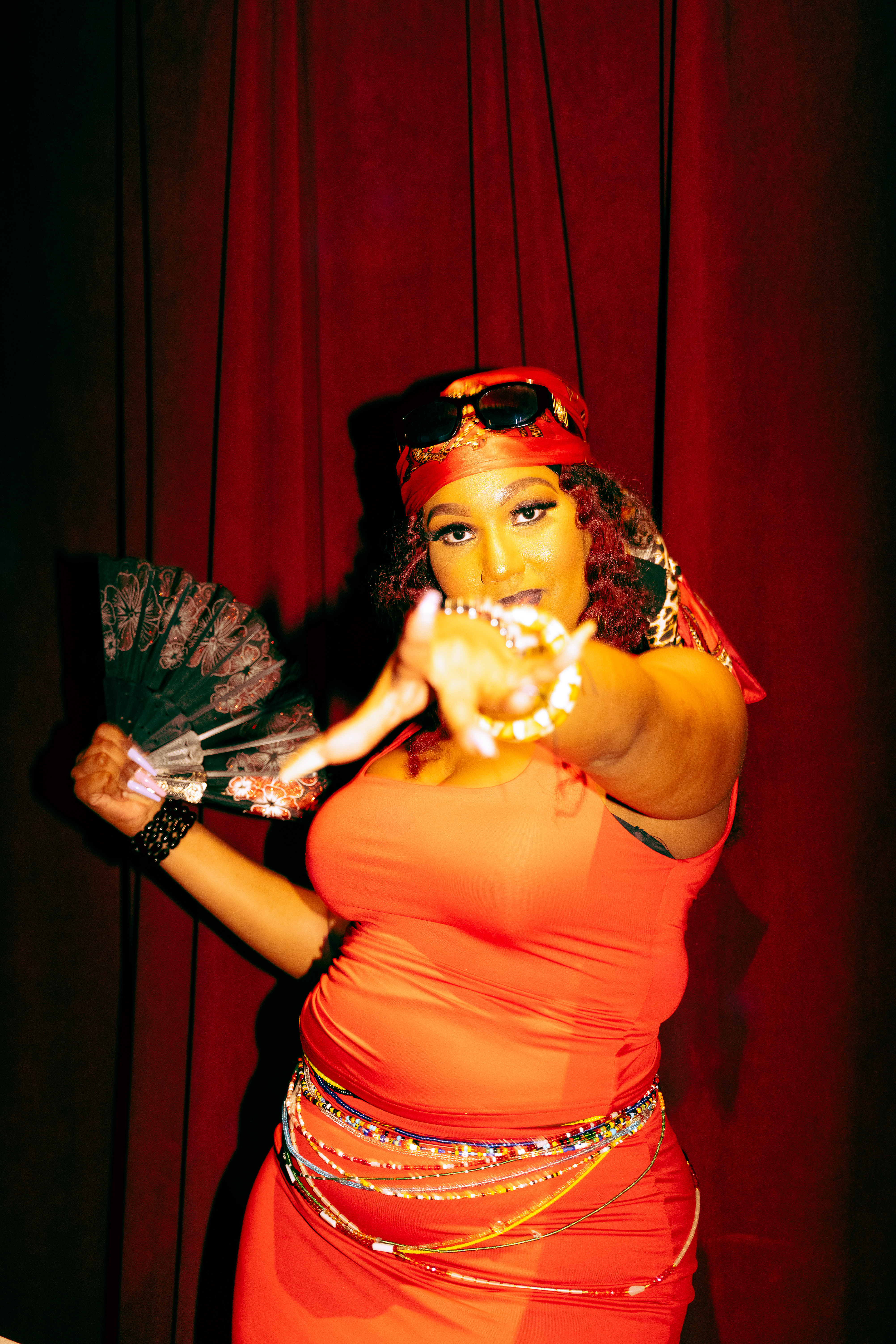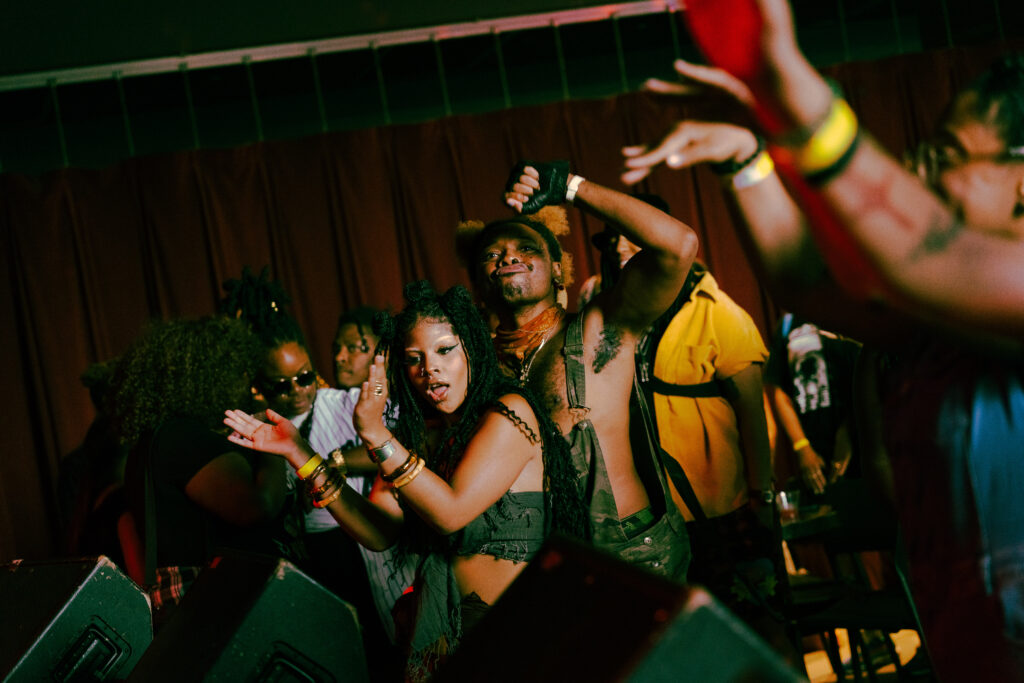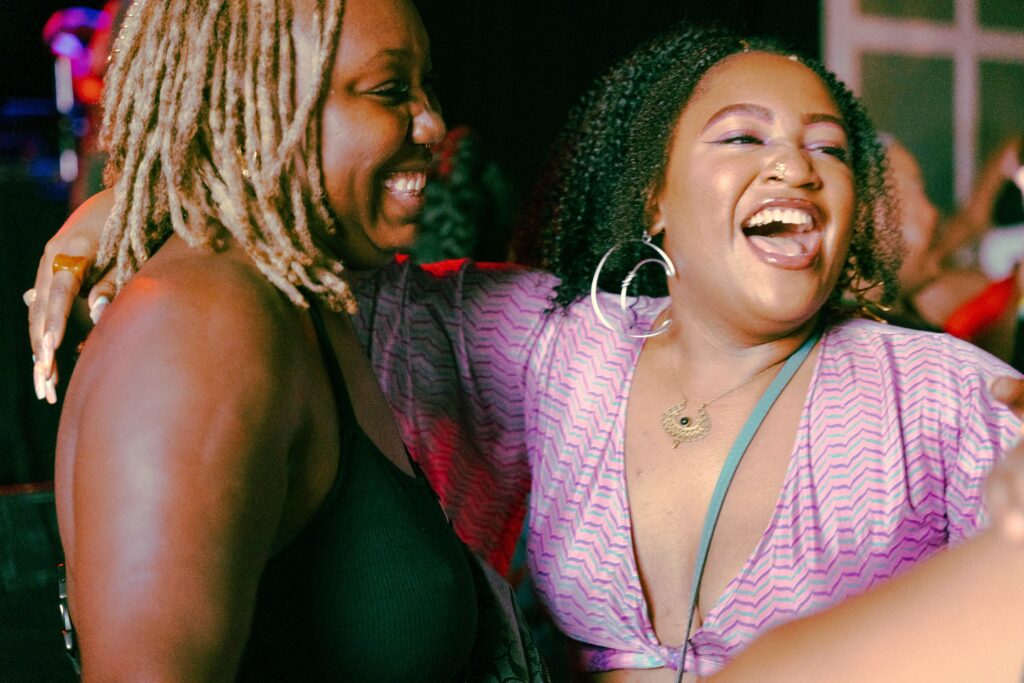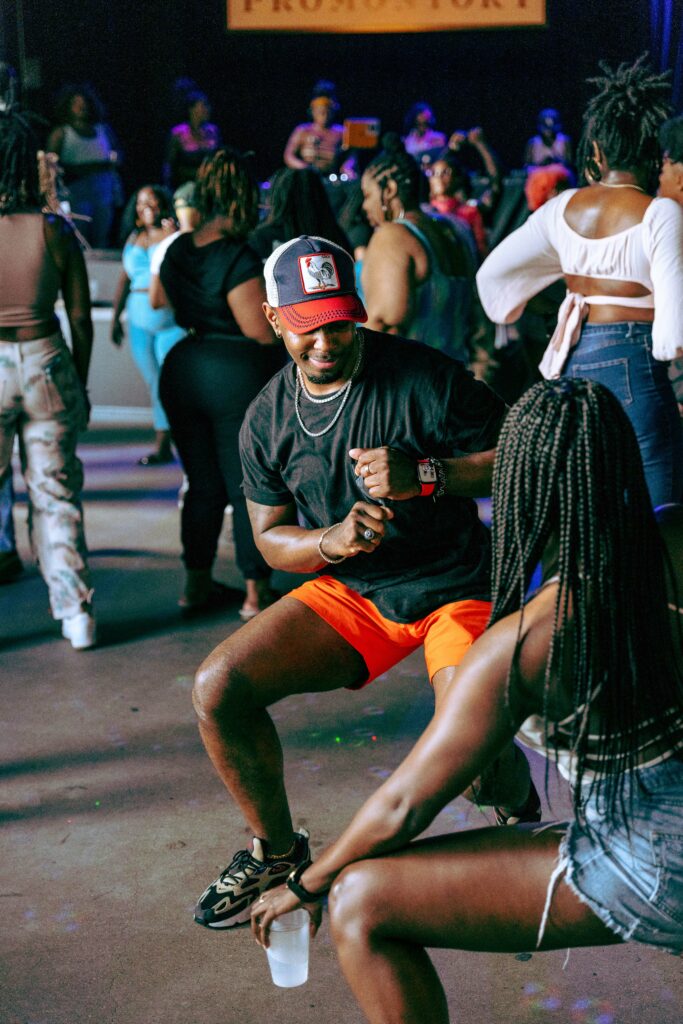On a warm Saturday evening in July, a crowd of people under the glow of the moon and Chicago’s city lights move their bodies to music radiating from a small stage on Oakwood Beach at the Silver Room Sound System Block Party. Rae Chardonnay looks out into the cluster of faces, embodying the role of emcee with bottomless energy, encouraging those present to let their bodies move in dialogue with the sounds of DJ k.tea and DJ Diaspora. Singing, stepping and shaking commences with the familiar gestures of vogueing and twerking melding into physical expressions that defy definition. Vibrations from early 80s house music blend into 2000s hip-hop, then transform again into contemporary afrobeats.
This is Party Noire.
Alchemizing the sound of Black Chicago
Rae Chardonnay and dr. nick alder started Party Noire in 2015 with the hopes of creating a space for Black folks, and more specifically queer Black folks, to experience an embodied sense of belonging and healing. With years of experience working as a therapist, alder knows the importance of embodied communal expression.
“Community is the site of where we experience healing and transformation. There are direct connections to our mental health and wellbeing when we are able to engage in these communal acts,” alder said.
Facilitating transformation through dance and music is the “communal act” that Party Noire is most interested and invested in.
Party Noire is not just a party for parties sake but, in the words of alder, “a party for, actually somatically moving energy together—collectively, and individually.” The group is best known for its day parties hosted throughout the year at The Promontory in Hyde Park but Party Noire also brings music and culture to block parties and other events throughout the city of Chicago and beyond.
As a DJ raised in Chicago’s music scene, Chardonnay’s mentors were essential to helping create the foundational sound of Party Noire. Chardonnay cites music mogul Duane Powell, the late great DJ Kwest_On, and lifelong sound curator Sean Alvarez as the trio that supported the start of her career. Each a legend in their own right, the guidance of these foundational figures served as a master class in the skill, artistry, and responsibility of what it means to be a DJ: an alchemist creating a specific sound and energy.
“I come from a background of house and dance music where dance is the most central, important thing,” said Chardonnay. “I think a lot about the kinetic energy that happens in our space. [As a DJ] you want some sort of transferable energy.” This energy transfer is what Chardonnay refers to as a “conversation” that happens between the DJ and the dancers. For her, music is the vehicle transporting everyone involved to a rare and powerful place of understanding and connection that transcends the spoken word.
Over the years, Party Noire has continued to prioritize the sounds of the Black diaspora and increasingly centered Black queer DJs. The timelessness of the music it centers mirrors the timelessness of the collective’s mission. Party Noire’s sound is constantly becoming, and has deep roots in Chicago house, disco, Brazilian and Latin music and funk. From Lisa Decibel, a Chicago-based music producer and sound curator, to Bonita Appleblunt, a DJ and sound engineer blending modern and underground music with afrobeats, to DJ Gemini Jones, whose DJ sets are strongly influenced by the likes of Spinderella. These artists and so many more have contributed to the unique skills, artistry and love of music to co-create Party Noire’s sound.
Cultivating safe space
For many queer folks throughout the midwest and across the county, Chicago is considered a safe haven. Still, finding a space that explicitly centers Black femme folks across the gender spectrum is rare. For people like Addy Peery, Party Noire is a sacred and unique space to feel fully expressed.
“I’m an evangelist for Party Noire,” said Peery. “I just think it’s the perfect queer Black party.”
After discovering Party Noire around its founding in 2015, Peery has consistently gone to its parties and activations. A Hyde Park resident of over fifteen years, The Promontory felt accessible in its proximity and design for Peery. Unlike many of the party venues in Chicago, The Promontory is fully ADA compliant with an elevator and ample seating. Peery emphasized their appreciation for the many chairs and tables right next to the dance floor, allowing folks who need to sit for extended periods of time the chance to stay engaged in the energy of the party instead of being sequestered to more isolated parts of the venue.
“I really love that as my journey into disability has transformed I’m still able to go to Party Noire and have a good time [while] keeping myself from having a flare up.”
Chardonnay and alder kept accessibility of all types central when choosing a space to ground their gatherings and when thinking about how cared for folks would feel during their parties. The co-founders don’t take the task of hosting lightly. “I’m thinking about accessibility all the way down to Rae and I having to drive someone’s car to their home and make sure they get inside safely. I think those things just feel like a part of our DNA and [it’s] why and how we keep doing what we do,” Chardonnay said.
Chardonnay’s relationship to the Promontory began long before it opened. While working for the Dorchester Art and Housing Collaborative, an initiative of the Rebuild Foundation, she was connected to those working to open the new venue in the heart of historic Hyde Park on 53rd Street. It was the intention of both co-founders from the conception of Party Noire to find a space that centered Black culture and was based on the South Side of the city.
Over the course of a near decade-long partnership, The Promontory’s security and staff have learned how to best support and honor the diverse needs of Party Noire community members. As a result of these long-standing connections and features of the venue, like its green room, which functions as a low sensory space and deescalation area, the collective has yet to have a physical altercation at an event. Additionally, prior to the day of a party, attendees receive community agreements. These house rules encourage, respect, love that centers the safety of Black femme and gender expansive people. Attendees are also offered access to a safety hotline during the party in case an immediate need or emergency arises.
“Everyone steps into the space and understands the assignment: we are here for Black Joy and we are here for Black Queer Black Joy,” alder said.
Peery, who has attended many Party Noire parties, would agree. “I can be my full Black, non binary, queer self at Party Noire. Growing up in Toledo, Ohio I didn’t have that space. I didn’t have predominantly Black spaces and predominantly queer spaces that catered to femmes and made me feel safe. I’m just really grateful that I live in a place where that kind of environment exists, especially in the current political moment.”
Visions of “Black Utopia”
Over the years, Party Noire’s commitment to investing in and developing Black creativity has continued to grow. The tradition of supporting artists across generations is central to Chicago’s creative community and especially important for Black queer creatives. With Party Noire being a direct product of the care and investment of many of Chicago’s great DJs, spacemakers and community builders, alder and Chardonnay hope to position the organization they’ve created as a medium to support others.
Party Noire has intentionally created space for newer DJs to cut their teeth by curating the sound at parties and events. DJ k.tea, a “house head” and lover of R&B music, and DJ Diaspora, a curator of global Black music, are resident DJs of the party who started out as Party Noire interns. Their presence at Party Noire events allows them the space and resources to grow their craft while contributing to the growing legacy of DJs that shape the collective’s sound.
Recently, their parties have started to include “open decks” where, for the first hour or two of the party, folks interested in DJing can plug in their equipment or use Chardonnay’s DJ set-up and lead party goers through a short music set. These avenues for aspiring music curators and DJs create a special opportunity to identify and encourage new talent.
While Chicago, especially the South Side, is well known for creating and cementing house music as a genre bending music tradition, the sound of the city continues to evolve and expand. Both Chardonnay and alder feel strongly that Party Noire remains inclusive of the many diverse and nuanced rhythms and forms that Black music has taken over time. It’s a space that celebrates and seeks to create a new collection of sounds that’s bigger than any specific genre of music while always keeping Black queer aesthetics at the core.
While the collective is more aligned and clear in its mission and role in the Chicago party scene, alder and Chardonnay have a more expansive vision for what Chardonnay refers to as the “Black Utopia”: a physical space that could serve as the “homestead” to hold all of the tactile and energetic resources of Party Noire. “A space to share the things that we know and have learned, and to be able to learn from folks within the community, as well,” said alder. “[We want to] create space for other folks who are also deepening their work as artists or creatives, space makers, community builders, so on and so forth.”
By investing in resident DJs like DJ K.Tea and DJ Diaspora, and opening up the stage and sound system to aspirational DJs from across the city, Party Noire continues to live into its larger vision for the future.
Getting free together
Reflecting on the many parties and activations Party Noire has hosted across the city of Chicago and beyond, alder returns to one of the first night parties the collective hosted at the Promontory as a moment that, for them, continues to embody the soul of Party Noire.
Growing up in a West Indian Pentecostal Church, at a young age, alder was exposed to a spiritual transcendence that’s possible when you bring people together to move their bodies collectively to music. In the more inclusive context of Party Noire, that same energy of transformation often appears. “What keeps me connected to the work is creating this space that’s not just for us to come party,” said alder. “It definitely feels like an intentional healing space where movement and this somatic collective experience happens.”
They described that night back in the early days of the collective and said the crowd danced so intensely, and that people were taking over the stage to further celebrate and express themselves through dance.“What I remember most about that experience is just like literally the vibration of the entire building,” said alder. They stood in awe as a building as large as the Promontory seemed to be shaking—moved by the enlivened bodies of a few hundred people.
This kind of communal quaking moves from the fingertips of the party’s DJs, through the bodies of its attendees and out into the city where folks leave notably impacted and possibly healed, even if only for a moment.
Jasmine Barnes is a writer and space maker based in Woodlawn with a deep commitment to relational healing and creative self expression. She last reviewed Rest Is Resistance for the Weekly.

